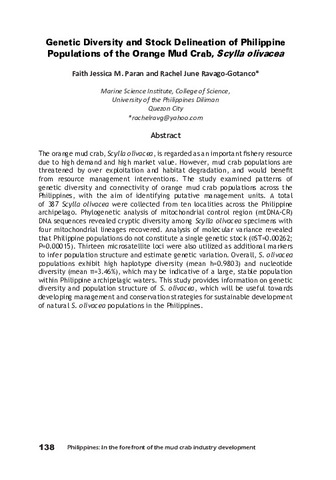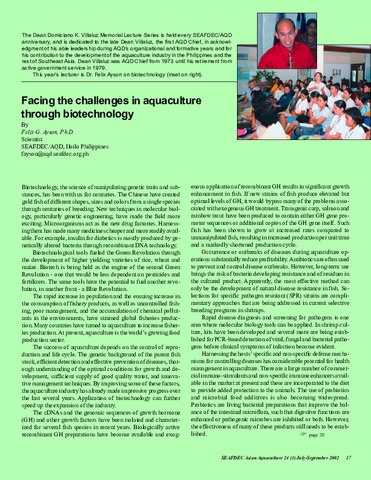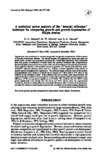| dc.contributor.author | Doyle, R. W. | |
| dc.contributor.author | Shackel, N. L. | |
| dc.contributor.author | Basiao, Zubaida | |
| dc.contributor.author | Uraiwan, S. | |
| dc.contributor.author | Matricia, T. | |
| dc.contributor.author | Talbot, A. J. | |
| dc.date.accessioned | 2013-01-24T07:48:46Z | |
| dc.date.available | 2013-01-24T07:48:46Z | |
| dc.date.issued | 1991 | |
| dc.identifier.citation | Doyle, R. W., Shackel, N. L., Basiao, Z., Uraiwan, S., Matricia, T., & Talbot, A. J. (1991). Selective diversification of aquaculture stocks: A proposal for economically sustainable genetic conservation. Canadian Journal of Fisheries and Aquatic Sciences, 48(S1), 148–154. | en |
| dc.identifier.issn | 0706-652X | |
| dc.identifier.uri | http://hdl.handle.net/10862/1334 | |
| dc.description.abstract | The genetic diversity of aquaculture stocks can be maintained, and their genetic impact on wild stocks minimized, by breeding programmes that deliberately generate genetic diversity. Current animal breeding practices are likely to reduce the diversity of domestic stocks if they are extended to aquaculture. It is proposed that national breeding programmes for aquaculture should, instead, try to develop numerous breeds specially adapted to local environments and aquaculture systems. An economic model is presented of decision-making by individual farmers who, in choosing which breed to produce, determine the "fitness" of the breeds in a meta-population that includes all breeds. As long as strong genotype-environment interaction for production traits is maintained by artificial selection, the economic self-interest of farmers should ensure the stability of genetic polymorphisms among breeds. Genetic variation would be conserved (in the among-breed component of genetic diversity) but not the primordial distribution of gene and genotype frequencies. Economic benefits to farmers, plus a high return on investment at the national or supra-national level, makes breed diversification an attractive conservation strategy even though it is admittedly a compromise from a purely genetic viewpoint. | en |
| dc.language.iso | en | en |
| dc.publisher | NRC Research Press | en |
| dc.title | Selective diversification of aquaculture stocks: A proposal for economically sustainable genetic conservation | en |
| dc.type | Article | en |
| dc.citation.volume | 48 | |
| dc.citation.issue | S1 | |
| dc.citation.spage | 148 | |
| dc.citation.epage | 154 | |
| dc.citation.journalTitle | Canadian Journal of Fisheries and Aquatic Sciences | en |
| dc.subject.asfa | aquaculture techniques | en |
| dc.subject.asfa | polymorphism | en |
| dc.subject.asfa | economic benefits | en |
| dc.subject.asfa | introduced species | en |
| dc.subject.asfa | population genetics | en |
| dc.subject.asfa | resource conservation | en |
| dc.subject.asfa | selective breeding | en |
| dc.subject.asfa | fish culture | en |
| dc.subject.asfa | genetic variation | en |
| dc.identifier.doi | 10.1139/f91-313 | |



